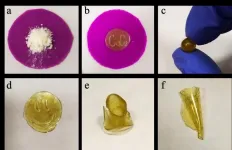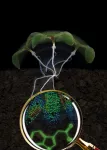Chemists at St. Petersburg University create renewable plant-based polymers
What makes them different is that they can be easily recycled
2021-04-12
(Press-News.org) Researchers at the Laboratory of Cluster Catalysis at St Petersburg University have synthesised polymers from biomass. What makes them different is that they can be easily recycled.
Today, our life is simply unthinkable without polymers. Plastics, fibres, films, paint and lacquer coating - they are all polymers. We use them both in our everyday life and in industry. Yet the goods made from polymers, e.g. bottles, bags, or disposable tableware, are used just once or for a short period of time before they are thrown away. Due to the chemical compounds that they may release during recycling, they pose a real threat to our environment.
There are few polymers that can be recycled many times. This stirs up interest in secondary recycling. However, the goods made from secondary raw materials are lower in quality compared to the goods from primary raw materials.
The new polymers are based on biomass compounds. Biomass is a renewable source of raw materials for the chemical industry of the future. The key component of these polymers is terpenols, i.e. compounds from natural alcohols. Among them are such well-known examples as: menthol derived from the essential oil in mint; and borneol - a large quantity of which can be found in the essential oil in the white fir tree.
The synthesised polymers may well be used for primary and secondary recycling. During secondary recycling, the polymer-based products can be converted into the primary compounds. This may be further followed by polymerisation. These polymers can be recycled at moderate temperatures.
'This can be said about recycling the materials based on our polymers. If they are recycled without oxygen, we can get natural alcohols or their derivatives that can be restored to the same alcohols. Because they are widely found in nature, they do not harm the environment,' said Svetlana Metlyaeva, the first author of the article and a researcher at the Laboratory of Cluster Catalysis at St Petersburg University.
The polymers of this type can be melted at about 120°C and shaped in another way, she said. When cooling, they become hard. Interestingly, the chemists repeated this cycle seven times and concluded that the polymers, when melted more than once, did not change their properties.
The researchers are planning to continue their work at the Research Park at St Petersburg University. They will study the mechanical properties of the polymers, including resilience, elasticity, strength, and others. This is an important step towards our understating of how to use them in industry.
'What we have achieved so far is only the ability to synthesise these polymers. Yet the properties of the polymer-based materials can vary. This depends on the way in which we synthesise them and what compounds we use. Now we have to modify the polymers themselves and the materials based on them. Then we will be able to talk about how we can use them,' said Svetlana Metlyaeva.
INFORMATION:
[Attachments] See images for this press release:

ELSE PRESS RELEASES FROM THIS DATE:
2021-04-12
Study: "Students Enrolled in Late-Start-Time Districts Report Higher Academic Achievement and Sleeping More"
Authors: Julio Caesar (Bloomington Public Schools), Rik Lamm (University of Minnesota), Michael C. Rodriguez (University of Minnesota), David J. Heistad (Bloomington Public Schools)
This study will be presented today at the AERA 2021 Annual Meeting.
Session: Organizational Effects Examining Academic Achievement and Student Support
Date/Time: Saturday, April 10, 2:30 p.m. - 4:00 p.m. ET
Main Finding:
Later school start times are linked ...
2021-04-12
Study: "Exploring the Association Between Student-College Match and Student Outcomes Over Time"
Author: Amanda M. Cook (Northwestern University)
This study will be presented today at the AERA 2021 Virtual Annual Meeting.
Session: Nuances and Challenges to Traditional Notions of College Success
Date/Time: Saturday, April 10, 10:40 a.m. - 12:10 p.m. ET
Main Findings:
Over the past 20 years, bachelor's degree completion rates for students who overmatch (i.e., attend colleges that may appear too academically selective for them) have improved substantially. Over the same time period, bachelor's degree completion rates for students who undermatch (i.e., attend colleges that appear too academically unselective ...
2021-04-12
Study: "Characterizing Remote Instruction Provided by Elementary School Teachers during School Closures due to COVID-19"
Authors: Michael Hebert (University of Nebraska-Lincoln), J. Marc Goodrich (University of Nebraska-Lincoln), Jessica M. Namkung (University of Nebraska-Lincoln)
This study will be presented today at the AERA 2021 Virtual Annual Meeting.
Session: Technology Supports and Experiences During the COVID-19 Pandemic
Date/Time: Saturday, April 10, 10:40 a.m. - 11:40 a.m. ET
Main Findings:
While teachers in spring 2020 felt that 60 percent of their students were prepared for the next grade level, in ...
2021-04-12
Study: "Do Students in Gifted Programs Perform Better? Linking Gifted Program Participants to Achievement and Nonachievement Outcomes"
Authors: Christopher Redding (University of Florida), Jason A. Grissom (Vanderbilt University)
This study will be presented today at the AERA 2021 Virtual Annual Meeting.
Session: On the Road to Equity: Studies of the Impact and Influences of Education Policy
Date/Time: Saturday, April 10, 2:30 p.m. - 4:00 p.m. ET
Main Findings:
Participating in elementary school gifted programs is associated with reading and math achievement for the average student, ...
2021-04-12
There are many questions surrounding the elementary particle neutrino, in particular regarding its mass. Physicists are also interested in whether besides the "classic" neutrinos there are variants such as the so-called sterile neutrinos. The KATRIN experiment has now succeeded in strongly narrowing the search for these elusive particles. The publication appeared recently in the journal Physical Review Letters.
Strictly speaking, the neutrino is not a singleparticle but rather comprises several species: the electron neutrino, the muon neutrino, and the tau neutrino. These particles are constantly transforming ...
2021-04-12
A team of researchers from the Max Planck Institutes of Developmental Biology in Tübingen and the Max Planck Computing and Data Facility in Garching develops new search capabilities that will allow to compare the biochemical makeup of different species from across the tree of life. Its combination of accuracy and speed is hitherto unrivalled.
Humans share many sequences of nucleotides that make up our genes with other species - with pigs in particular, but also with mice and even bananas. Accordingly, some proteins in our bodies - strings of amino acids assembled according to the blueprint of the genes - can also be the same as (or similar to) some proteins in other species. These similarities might sometimes indicate that two species ...
2021-04-12
A team of scientists at the Max Planck Institute for Developmental Biology in Tübingen and the University of Bayreuth have created a novel tool that provides a real-time visualization of the growth-regulating hormone auxin in living plant cells. This new biosensor enables them to observe spatial and temporal redistribution dynamics of the plant hormone, for example in conjunction with changing environmental conditions.
Auxin plays a central role in plant life. The hormone regulates various processes, from embryonic development to the formation of roots and the directional growth in response to light and gravity. Auxin binds to specific receptors in the nucleus of a cell, leading to an activation of signaling cascades that ...
2021-04-12
Study: "The Infrastructure of Social Control: A Multi-Level Counterfactual Analysis of Surveillance, Punishment, Achievement, and Persistence"
Authors: Odis Johnson (Johns Hopkins University), Jason F. Jabbari (Washington University in St. Louis)
This study will be presented today at the AERA 2021 Virtual Annual Meeting.
Session: The School-to-Prison and Prison-to-School Pipelines: Studies of the Nexus of Schooling and the Justice System
Date/Time: Sunday, April 11, 10:40 a.m. - 12:10 p.m. ET
Main Findings:
After controlling for levels of school social disorder and student misbehavior, students attending ...
2021-04-12
New research by Yale Cancer Center shows insights into modeling resistance to immune checkpoint inhibitors, a form of cancer immunotherapy. The study was presented today at the American Association of Cancer Research (AACR) virtual annual meeting.
"Acquired resistance to immune checkpoint inhibitors is a growing clinical challenge. About 50% of lung cancer patients who initially respond to immune checkpoint inhibitors eventually develop acquired resistance to these therapies," said Camila Robles-Oteiza, lead author of the study from Yale Cancer Center. ...
2021-04-12
CORVALLIS, Ore. - Coastal communities face increasing danger from rising water and storms, but the level of risk will be more closely tied to policy decisions regarding development than the varying conditions associated with climate change, new research by Oregon State University suggests.
The findings, published in the journal Water, provide an important framework for managing the interactions between human-made and natural systems in cities and towns along shorelines as the Earth continues to warm, the researchers said.
Professor Peter Ruggiero of OSU's College of Earth, Ocean, and Atmospheric Sciences and John Bolte, chair of OSU's Biological and Ecological Engineering program, led the study, which employed a modeling platform known as ...
LAST 30 PRESS RELEASES:
[Press-News.org] Chemists at St. Petersburg University create renewable plant-based polymers
What makes them different is that they can be easily recycled



